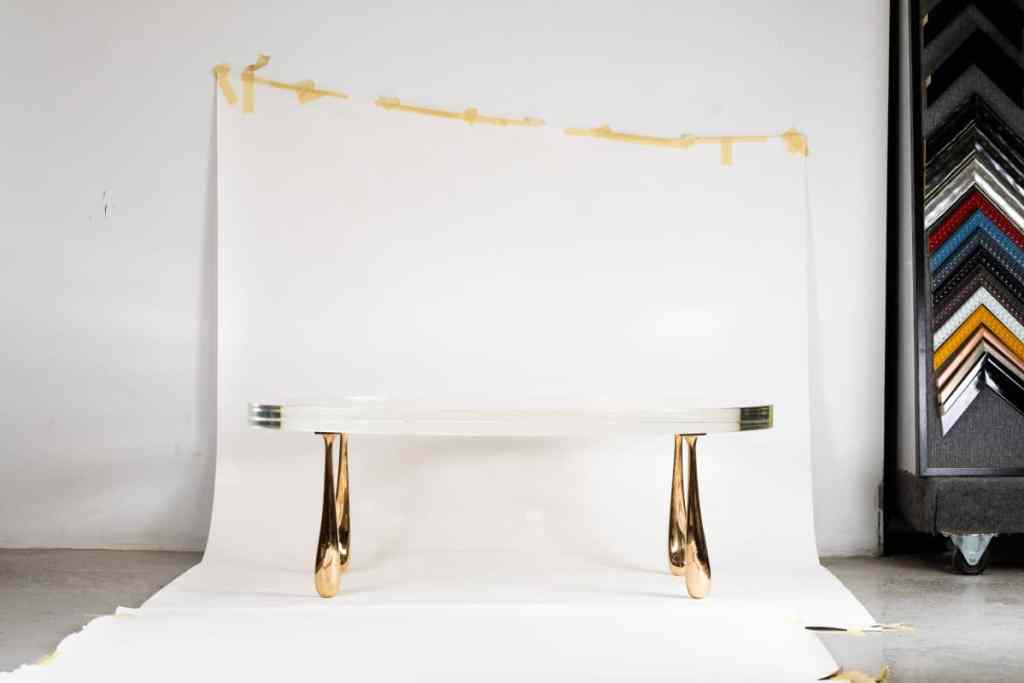Where function meets design is where StackLab lives, works, and breathes. We sat down with Jeffrey Forrest, co-founder and operator of StackLab, to talk about his multi-disciplinary design studio that focuses on special, heirloom-quality work and developing material processes.
Forrest explained that he and his team aren’t formalists. While their designs are undeniably eye-catching, StackLab focuses on materiality and manufacturing technique first and foremost.
“We experiment with material and craft. However, we’re not artisans. We approach the work as architects and strive for new, system-based outcomes. Our work is very carefully conceived, often digitally optimized, often (at least partly) digitally prototyped and developed using a combination of contemporary and traditional fabrication techniques. We are less interested in material re-use, as we are material re-imagination. That is to say, we want to transform materials through innovation,” said Forrest.
One of their recent creations is the Garrison series. It’s a series of sculptural castings made using structural steel salvaged from the former historic Garrison Bridge in Toronto. Partnering firms Rebart + StackLab procured two tons of rebar from the bridge during its demolition in early 2015, and have created a limited series of 102 units. The Garrison is intended to use as a seat or low table. Derived using state-of-the-art digital design and fabrication technology, the Garrison is optimized to be as light and as strong as possible.
Along with the Garrison’s unique base material is its uniquely low scrap rate. Forrest explained that the scrap rate is determined by defective pieces that don’t make it off of the floor. In the case of the Garrison, Forrest and his team found a way to control the location of the manufacturing defect, and exploit it. Stacklab concealed imperfections by applying a thermal, bronze metal coating to the tip of the castings. Units 1-51 in the series have this premium detail. As a point of fact, this metal is (essentially) applied with a flamethrower.

While the Garrison is derived from steel, StackLab’s Ash356.0 series is made using diseased wood and recycled aluminum. Each piece’s base is milled from a diseased Ash log. The sawdust from the milling process is reclaimed and compacted around the base to create a mold. Recycled aluminum beer cans (generously donated by Steam Whistle Brewing) are melted and cast into the sawdust mould to form a conic shape. The sawdust mould burns away when it comes into contact with the molten metal, leaving irregular, textured impressions on the aluminum cone. Each cone is subsequently polished and fastened to the wood base to form functional stools and tables. With the four units produced in the Ash A356.0 series, StackLab combined their knowledge of traditional fabrication techniques and experimental research to demonstrate how sustainable design fundamentally enriches process and product.
For Forrest, inspiration can strike at any moment for creating a new product. One day he was riding his motorcycle through Northern California to see the milling of 5,000 square feet of redwood decking for a client. However, along this journey, he stumbled across the “Mill B Reclamation Project” located at the Pacific Lumber Company (PALCO) site in Scotia, California. In addition to disassembling the largest and oldest redwood mill in the word, part of this project included reclaiming historic, 2200-4000 year old redwood burls from a nearby log pond. Forrest’s interest was peaked when he saw the figure of the burls. He wanted to figure out a way to turn the pithy material (these burls tend to fall apart in your hands like old cork) into a functional design piece. He decided to square-cut the material and cast it in smoked resin, which is poured in multiple layers over a span of 16 weeks in a vacuum chamber to get it to the level of clarity that’s shown in the photos below.
When you’re purchasing a design piece from StackLab, you’re not purchasing a product. You’re purchasing something much more – a ‘language’ that they’ve produced in order to supply well-crafted, functional designs.
To see more from StackLab and for a full list of available manufacturers, sign up with DesignerInc – get started today!

